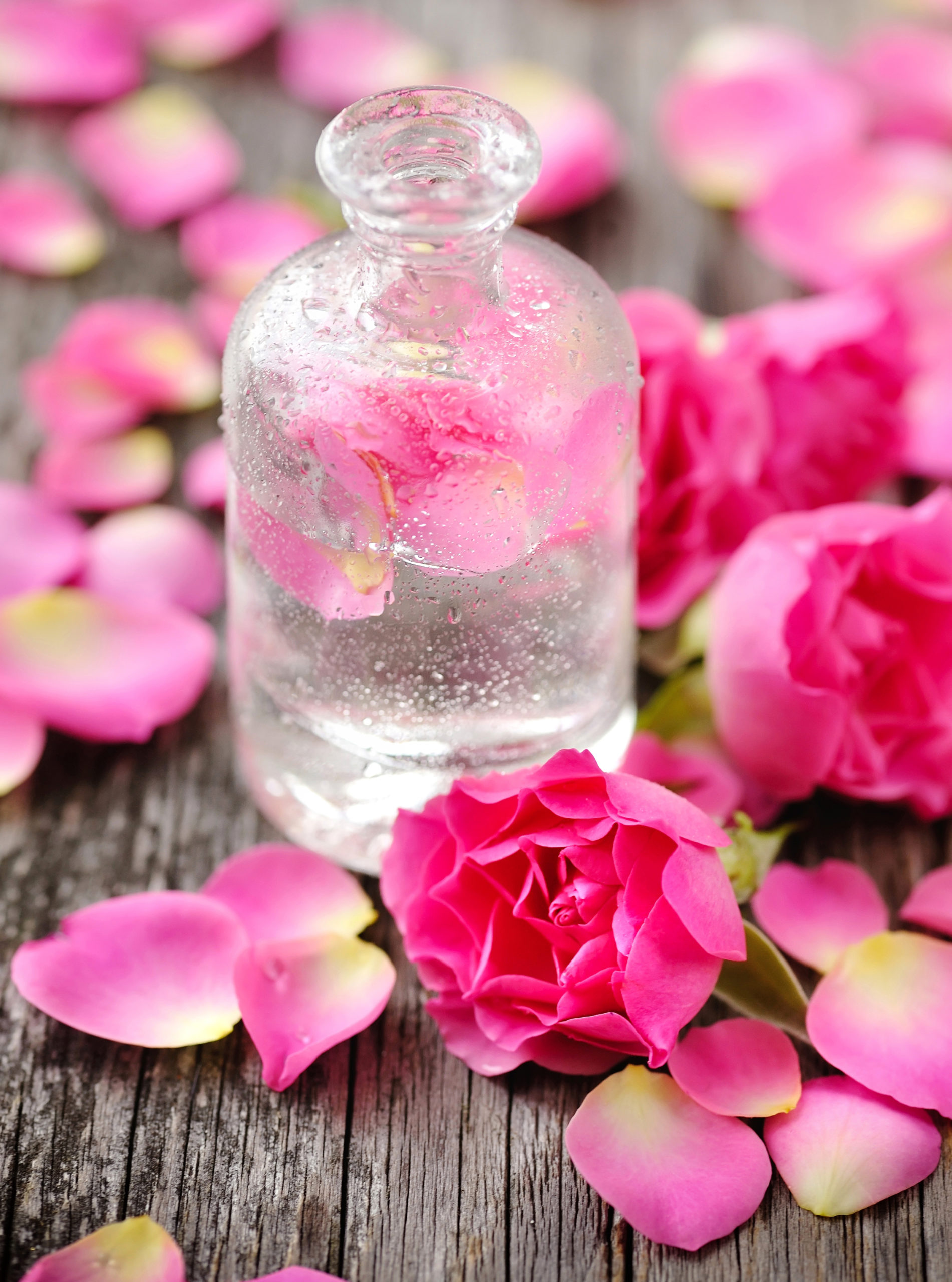Picture a lush garden brimming with vibrant roses, their delicate petals concealing a treasured secret: rose water. This fragrant liquid, a time-honored beauty and health staple, offers a wealth of benefits, from soothing irritated skin to adding a touch of elegance to culinary creations. Join us as we unveil the magic of rose water, exploring its rich history, diverse applications, and the science behind its allure.
What is Rose Water? More Than Just a Pretty Fragrance
Rose water isn’t simply fragrant water; it’s a hydrosol, created through the steam distillation of rose petals. Often a byproduct of rose oil production, rose water retains its own unique chemical profile and therapeutic benefits. While the similar-sounding rosé wine might spring to mind (like the popular Hampton Water Wine Co.), remember that rosé is an alcoholic beverage, whereas rose water is a non-alcoholic, fragrant liquid used in skincare, cooking, and various cultural traditions. For the most potent rose water, look for varieties derived from Damask or Cabbage roses, known for their rich concentration of beneficial compounds.
Unveiling the Beauty Benefits of Rose Water
Rose water’s remarkable properties extend far beyond its captivating fragrance. For centuries, it’s been a cornerstone of beauty rituals, and modern science is beginning to understand why.
Skincare Superhero
Rose water can be a true game-changer in your skincare routine. It acts as a natural toner, gently balancing your skin’s pH and prepping it for other products. Healthline suggests that its anti-inflammatory properties may help soothe irritation and redness, potentially offering relief for conditions like eczema or rosacea. Some studies even suggest that rose water may possess anti-aging properties, possibly smoothing fine lines and wrinkles, though further research is needed to confirm these effects. And for those battling acne or blemishes, rose water’s antiseptic qualities may help prevent infections and promote healing.
If you’re concerned about tan lines on boobs, especially from bikini tops, consider using rose water as a soothing after-sun treatment. Its gentle nature can help calm sun-exposed skin and minimize redness. You can also explore alternatives like tankini tops or one-piece swimsuits to avoid those pesky tan lines, or even try a teardrop boobs style for a different look.
Hair and Scalp Savior
Rose water isn’t just for your face; it can also work wonders for your hair and scalp. A rose water rinse can help soothe an itchy scalp and add shine to dull hair.
Aromatherapy Wonder
Inhaling the delicate aroma of rose water can be a deeply relaxing experience. Diffusing rose water in your home can create a calming atmosphere, potentially reducing stress and promoting a sense of well-being, although more research is needed to fully understand these effects.
Beyond Beauty: Exploring the Health and Culinary Uses of Rose Water
Rose water’s versatility extends far beyond the beauty aisle.
A Health Tonic
Healthline highlights several potential health benefits of rose water. Some believe it can soothe sore throats and even help with headaches. Its antioxidant content may contribute to overall health, although further research is necessary to fully explore these potential benefits.
A Culinary Delight
Rose water is a cherished ingredient in many cuisines, particularly in the Middle East and South Asia. It lends a unique floral note to desserts, beverages, and even savory dishes. Imagine delicate rose-infused teas, fragrant biryanis, or pastries with a subtle hint of rose – the possibilities are endless.
Making Your Own Rose Water: A DIY Guide
Creating your own rose water at home is surprisingly simple.
Simmering Method
The easiest method involves simmering fresh or dried rose petals in water. While this method doesn’t produce the most potent rose water, it’s a great way to experience the joy of creating your own beauty elixir.
Distillation Method
For a more concentrated and potent rose water, distillation is the preferred method. While slightly more complex, it allows you to capture the full essence of the rose.
Storage Tips
Store your homemade rose water in a sterilized, dark glass container in the refrigerator to maintain its freshness and potency.
Choosing the Best Rose Water: A Buyer’s Guide
When shopping for rose water, opt for organic and 100% pure varieties. Avoid products with added ingredients that might dilute its effectiveness. Reputable brands like Heritage Store, Leven Rose, and Dabur are known for their quality rose water products.
Rose Water for Drinking: Potential Benefits and Considerations
Drinking rose water, especially food-grade varieties, has a long history in various cultures. While research is ongoing, it may offer several benefits:
- Antioxidant and Anti-inflammatory Effects: Rose water might help protect cells from damage and reduce inflammation throughout the body.
- Digestive Support: Some studies suggest that it might aid digestion and relieve occasional constipation.
- Mood Enhancement: The calming aroma and flavor of rose water might help reduce stress and promote relaxation.
A Word of Caution:
Before incorporating rose water into your diet, especially if you’re pregnant, breastfeeding, or have any health concerns, consult your doctor or a registered dietitian. Start with small amounts and discontinue use if you experience any adverse reactions.
Rose Water in Muslim Culture: A Symbol of Purity and Hospitality
Rose water holds deep cultural significance in many Muslim communities. It’s a symbol of purity, hospitality, and spirituality, often used in religious rituals, offered to guests as a gesture of welcome, and incorporated into traditional cuisine.
For instance, during Ramadan, rose water is often used to break the fast, symbolizing renewal and revitalization. Its fragrance graces religious gatherings and ceremonies, adding a touch of spiritual significance.
Rose Water: A Timeless Tradition, A Modern Marvel
From ancient beauty secrets to modern wellness practices, rose water remains a versatile and valuable addition to any self-care routine. Embrace its fragrant magic and discover the timeless beauty and health benefits that have captivated generations.










